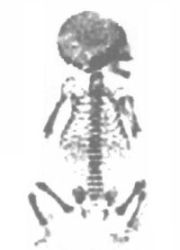Osteoporosis makes the bones fragile and more likely to break after even a simple fall. Professor Nicholas Harvey leads our research to see if we can find ways of preventing this. We know that the time spent in the womb is when the skeleton is growing at its fastest; and this may significantly affect that person’s risk of osteoporosis and having a fracture in later life.
By studying the SWS women and babies, the research team is aiming to find out what might affect babies’ bone growth. During pregnancy, some women had two heel scans that show their bone changes during pregnancy.

Over 1,000 babies had a bone density (DXA) scan within a few weeks of birth to measure their bones. This provides an idea of how the baby’s skeleton grew during the pregnancy. This is being compared with the lifestyle information from the parents to help identify key factors that can affect babies’ bone growth before it is born. Some babies’ fathers were also asked to have a bone scan, which provides useful information about the role the father has in determining the baby’s bone structure.
Further bone scans have been done at subsequent waves of SWS follow-up and are described in the Children’s Follow-up page
